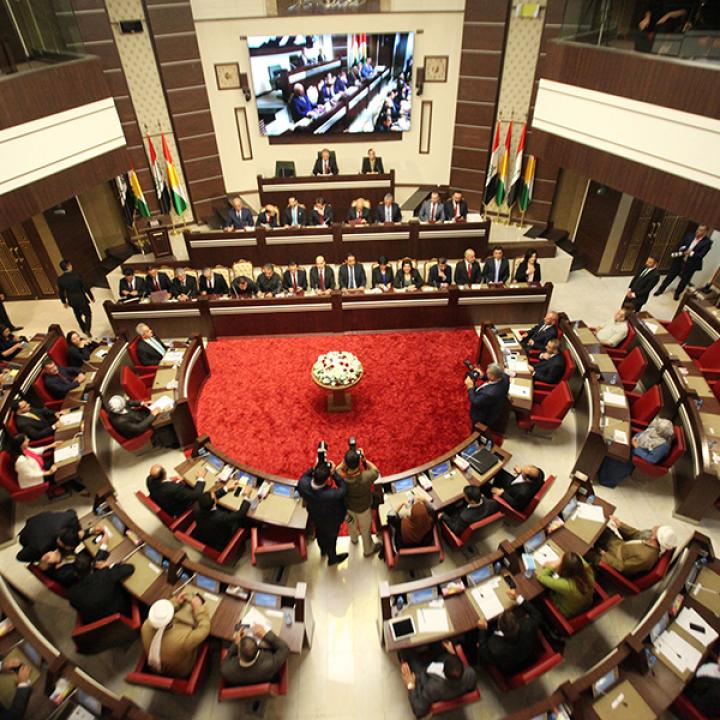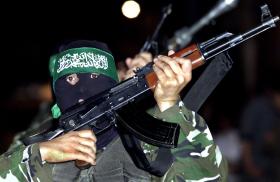
- Policy Analysis
- Fikra Forum
Sooner Rather Than Later: The Demand for Decentralization in Iraqi Kurdistan

As Iraqi Kurdistan faces several severe crises simultaneously, it must evaluate the benefits and limitations of a popular call to reform and decentralize its current model of government. The Kurdistan regional government’s (KRG) current outdated model of governance will likely prove to be ineffective in handling these major challenges, revealing the urgent need to decentralize.
The calls for decentralization acknowledge a trend in the region towards the opposite direction. Since 1991, Iraqi Kurdistan has been governed by two main political parties, namely the Kurdistan Democratic Party (KDP) and the Patriotic Union of Kurdistan (PUK). The two parties have governed the region under a centralized, albeit an unified model. As time has passed, this model has demonstrated a number of drawbacks that have increasingly plagued the KRG.
The Middle East Research Institute (MERI), an Erbil based think tank, describes the the current administrative structure of the KRG as having evolved “into a highly centralized, inflated, and inefficient bureaucracy.” MERI criticizes the KRG’s centralized form of governing as having been “justified and defined by KRG officials as an attempt to create features and elements of central authority and control,” which have in fact negatively affected the “functionality of its governing system.” Though this process has been years in the making, the added stress of less investment in the coming months will put additional pressure on existing government structures.
A bloated public sector, a weak private sector, and an undiversified economy have enabled a centralized rentier state that has created a series of problems for many ordinary people. Old government processes are dated and in need of an upgrade. For example, ministries cannot accept digital forms, and physical documents must be hand delivered to offices in Erbil, the capital of Iraqi Kurdistan. This delayed process results in slow day-to day-services, an issue that could be solved by simply allowing for electronic copies of forms. This significant feature of regional bureaucracy is just one instance of disorganization that has made the public question the raison d'état of the local authorities they elected.
Decentralization against an uncertain political backdrop
As such, decentralization has become a buzzword for the KRI’s political parties as a way of reforming this bloat, though each party has its own reasons for championing the concept. Both the KDP and the PUK have recently gone through a leadership transition, and the new generation of leaders of the region’s main parties have been keen to show their power and character to their constituents. The young and charismatic leaders of the Barzani (KDP) and Talabani (PUK) families aimed to capitalize on the legacies they inherited, including the polarization within Kurdish society. This polarization has evolved into a soft civil war—particularly visible on social media. Within this framework, decentralization will be seen as sharing power and resources between the two poles.
Over the past several years, these poles have been put out of balance. Previously, the Kurdistan region’s political structure has been loosely modeled on a balance of power system. However, the current leadership lacks the coherence and power base such as seats in parliament, size of the party constituency, and control of government apparatuses are distributed unequally—resulting in the precarious balance of power that is exhibited by most centralized political systems.
In recent years, the KDP has emerged as a hegemonic political party. The KDP’s transition from a dominant party into a truly hegemonic one occurred gradually, as the PUK proved unable to recover from internal party divisions. The resulting power contest in zones previously dominated by the PUK emerged out of growing calls for reform and change. The PUK’s current aim in advocating for decentralization as a way to reclaim its position is apparent, not only to the KDP, but to the other political parties and the population.
When one political party increases its power, the threatened party will often attempt to regain its leverage by forming a defensive coalition to “counterbalance” the more dominant party. While the PUK attempts to capitalize on this novel shift in Kurdish politics and return to its former ‘status quo,’ it will find added difficulties in such an uncertain, under-developed political landscape. Consequently, Kurds are left with limited political options and must choose between a ‘strong’ KDP or weaker and internally divided parties.
From its position of power, the KDP does not directly oppose decentralization, but instead has its own interpretation of the concept not necessarily compatible with the PUK’s understanding. The KDP’s interpretation of decentralization is that it would primarily be an administrative move, affecting all of Kurdistan’s provinces and districts. On the other hand, the KDP continues to emphasize the power of the government. These semi-conflicting messages signify that the KDP will allow for limited administrative decentralization, as long as this does not include any changes in the power of the regional central government. In contrast, the PUK interprets decentralization as limiting the centrality of power in the region.
Adding to these two political interpretations of decentralization, there is also a popular demand for it, echoed by the KRI’s opposition political parties. Even so, the power struggle between the different political parties is just one example of the complex dynamics at play amidst the current decentralization discourse. Therefore, the current decentralization discussion must be interpreted within the framework of political party competition.
Other political parties—such as the Gorran movement and the KRI’s Islamist parties—have various stances regarding this issue. For parties without an armed group, decentralization is a way to empower the local government and disperse power and governing. Some understand decentralization as a way to renew old divisions that linger from the Iraqi Kurdish Civil War in the 1990s. Others support decentralization as a way of reallocating revenues that they see as distributed unequally. Still others fear the effects of decentralization, believing that such a move may ultimately destroy the already precarious equilibrium in the regional government.
Steps for accomplishing effective decentralization
Considering the traditional structure of the Kurdish society, the debate surrounding decentralization on the conceptual level is a top priority. Therefore, political parties and other elites will require a clear conceptual understanding of the process before initiating any real change. The conceptual problem is not unique to decentralization—it applies to most of governing related concepts. German historian Reinhart Koselleck emphasizes that concepts of governance “are both factors and indicators of historical movement.” He argues that there is a causal connection between the historical events that transported corporate social orders in early modern systems and the changes in political-social language; “the central concepts did not just reflect social reforms but also played an active role in this process.”
In the Kurdish case, the ambiguity about the concept of decentralization makes conversations, arguments, and exchanges among parties and their members almost impossible. Hence, the first step for the KRG is to adopt the ethos of pragmatic decentralization and transparency, which can begin with white and green papers on the issue made available to the public.
The second step is to lay out a clear and realistic time frame for the process, beginning with the reform of the central government. Once a more efficient and capable central authority is established, the KRG will be able to target fiscal and administrative decentralization.
The third step is to change the electoral system of the region into a mixed electoral system such as a mixed member majoritarian (MMM), which would allow for multiple elections. While people need to know their representatives, the region also requires representatives that have knowledge and expertise in governing areas such as budgeting, planning, energy, and environment, who may be better represented in a mixed electoral system.
Competing factors
Though these reforms take time, the necessity and urgency of such changes are becoming increasingly clear. The KRG is facing a new era of ‘post-oil’ centered governance as a result of the COVID-19 oil market crash, and this makes decentralization all the more pressing. Prior to international intervention against ISIS, the region enjoyed an period of ‘easy’ governing; oil prices were high and businesses were booming. During this period of growth, the KRG was able to enlarge its public sector and satisfy parties’ constituencies to a certain degree.
However, as the world enters this current period of high volatility—driven by the global pandemic and general public disenchantment with politics—the region must prepare to move on from this so-called ‘easy’ governing. Decentralization will minimize organizational costs, needed to achieve an optimal assignment of powers. It will also open up the economy and the regional market to the public and private sector, which will hopefully promote much needed job growth.
Another factor that should push the region towards greater efficiency and decentralization is its complicated relations with Baghdad. While the KRG is recognized in the Iraqi constitution, the relationship between Erbil and Baghdad remains one based on force rather than law. Currently, the KRG must constantly negotiate with the central government in Baghdad to establish a budget, share in government, and other aspects of governance. A better-governed KRG will be better suited to perform at the negotiation table with the central government and vice versa. Even though the country is federal by its constitution and heavily centralized, it is obvious that the Iraqi central government and the KRG require a decentralization of the political, economic, and administrative systems.
Yet despite repeated calls for decentralization in Iraqi Kurdistan, the region has been heading in the opposite direction, increasingly concentrating power in the hands of small parties and business echelons. Not long ago, the region had a vibrant opposition, a dynamic free media, and effective civil societies, which all impacted decision making in the region. Unfortunately, Iraqi Kurdistan is no longer in this position. Even within the political parties, the politburo —the former symbols of the powerhouse in the region —no longer hold the same power and are marginalized by the concurrent rise of family power within the main parties. From this perspective, the Kurdistan region is increasingly becoming oligarchic like some sections of the Middle East.
Against this complex backdrop, it becomes clear that the Kurdistan region, like the rest of Iraq, requires some kind of decentralization, even if different parties have not yet agreed on what form this decentralization will take. Yet consensus must be reached at some point in order to move forward. Reforms towards decentralization tend to be particularly difficult to enact because centralization is treated as the main feature of power in almost every aspect of society; whether it be in the family structure, popular culture, and religion. As such, the shift towards decentralization requires a long and multifaceted approach.
For the international community, including the United States and other international powers that have attempted support the security apparatuses in the region, decentralization should be guided in a way to unify the region and establish a more coherent governing system. This might serve as a way to overcome the divisions in Iraqi Kurdistan and make it a more reliable regional partner.
However, for decentralization to occur, a number of steps within a realistic time frame are required. The diffusion of power and responsibility among the actors in provinces and districts will stabilize Iraqi Kurdistan and will be a win-win situation for all sides.


